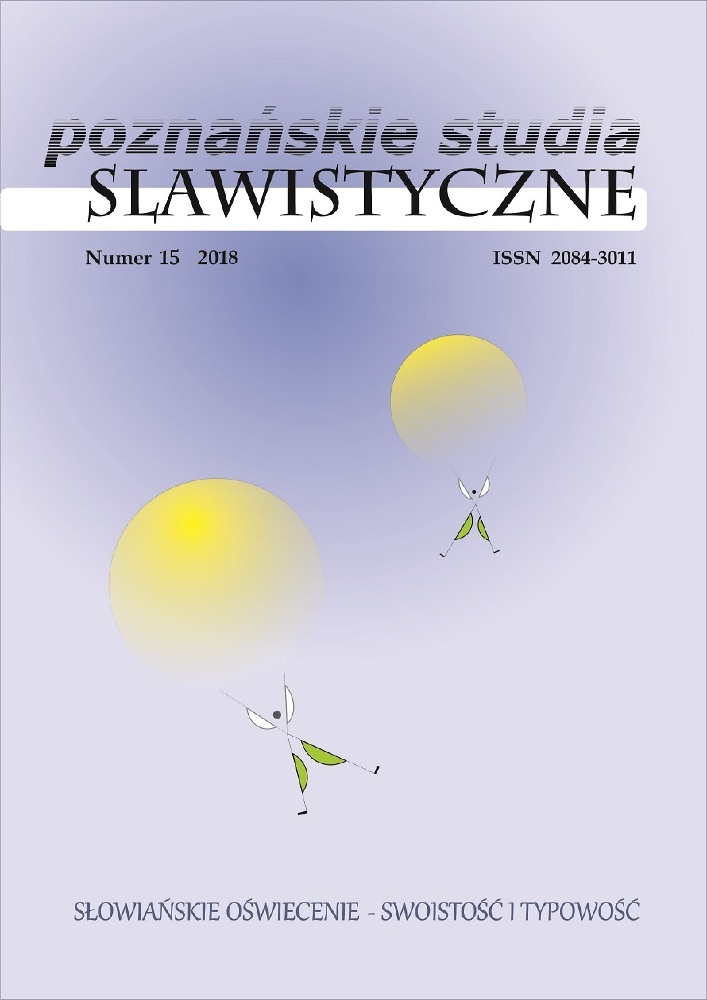Abstract
In his meta-literary and para-textual statements, Milan Kundera has been frequently turning to the issue of the enlightenment narrative experiments considered as the initial ones for the twentieth-century (post)modern creative strategies. Those experiments resulted from the striving for suppression of the over-prescription characterized the classicist rules, and they managed to direct attention to the literary genres which were undermined by the Enlightenment era that is in other words and above all, novel. In order to reveal this “modernity” of the eighteenth-century prose, the Czech writer in the work entitled Jacques and his master (1971) performed a “cultural translation” (variation) of the famous text by Diderot into the form of drama. Kundera was focused on the devices used by the French encyclopaedist which enabled him to expose the “evidence of trick” regarding the anti-illusion and fictitious character of literary representation of the world. He was, therefore, interested not so much in the philosophical and ideological background of Diderot’s tale dedicated to the romances of Jacques the Fatalist, but in the author’s freedom in his “play with the romance’s conventions” which even then was undergoing the process of fast schematisation.References
Boy-Żeleński, T. (1985). Od tłumacza. W: D. Diderot, Kubuś Fatalista i jego pan. Przeł. T. Boy-Żeleński. Warszawa: Państwowy Instytut Wydawniczy, s. 5–10.
Bystřický, J. (2001). Mediální diskurs postmoderny. K problematice fatálních strategií a seduktivních her narativních diskursů. Praha: Karolinum.
Chaunu, P. (1989). Cywilizacja wieku Oświecenia. Przeł. E. Bąkowska. Warszawa: Państwowy Instytut Wydawniczy.
Češka, J. (2005). Království motivů. Motivická analýza románů Milana Kundery. Praha: Togga.
Diderot, D. (1765). Encyclopédie ou Dictionaire raisonné des Sciences, des Arts et des Métiers, t. 9. Neuchâstel.
Diderot, D. (1985). Kubuś Fatalista i jego pan. Przeł. T. Boy-Żeleński. Warszawa: Państwowy Instytut Wydawniczy.
Doležel, L. (2003). Heterocosmica. Fikce a možné světy. Praha: Karolinum.
Eco, U. (1994). Dzieło otwarte. Forma i nieokreśloność w poetykach współczesnych. Przeł. J. Gałuszka, L. Eustachiewicz, A. Kreisberg, M. Oleksiuk. Warszawa: Czytelnik.
Głowiński, M. (1992). Poetyka i okolice. Warszawa: Wydawnictwo Naukowe PWN.
Hodrová, D. 1989, Hledání románu. Kapitoly z historie a typologie žánru. Praha: Československý spisovatel.
Horkheimer, M., Adorno, T.W. (1994). Dialektyka oświecenia. Fragmenty filozoficzne. Przeł. M. Łukasiewicz. Warszawa: Wydawnictwo IFiS PAN.
Iser, W. (2017). Fiktivní a imaginární. Perspektivy literární antropologie. Přel. M. Petříček. Praha: Karolinum.
Jauss, H.R. (2004). Proces literacki modernizmu od Rousseau do Adorna. Przeł. P. Bukowski. W: Odkrywanie modernizmu. Przekłady i komentarze. Red. R. Nycz. Kraków: Universitas, s. 21–59.
Kostkiewiczowa, T. (2011a). Co to jest klasycyzm? Wprowadzenie do (kolejnej) dyskusji. W: Długie trwanie. Różne oblicza klasycyzmu. Red. R. Dąbrowski, B. Dopart. Kraków: Księgarnia Akademicka, s. 7–19.
Kostkiewiczowa, T. (2011b). Koncepcje przyjemności w myśli estetycznej XVIII wieku. W: Przyjemność w kulturze epoki rozumu. Red. T. Kostkiewiczowa. Warszawa: Wydawnictwo DiG, s. 293–311.
Kundera, M. (1961). Umění románu. Cesta Vladislava Vančury za velkou epikou. Praha: Československý spisovatel.
Kundera, M. (1998). Sztuka powieści. Przeł. M. Bieńczyk. Warszawa: Czytelnik.
Kundera, M., 2003, Zdradzone testamenty. Esej. Przeł. M. Bieńczyk. Warszawa: Państwowy Instytut Wydawniczy.
Kundera, M. (2016a). Wprowadzenie do wariacji. W: M. Kundera, Kubuś i jego Pan. Hołd w trzech aktach dla Denisa Diderota. Przeł. M. Bieńczyk. Warszawa: Wydawnictwo ABW, s. 7–22.
Kundera, M. (2016b). Kubuś i jego Pan. Hołd w trzech aktach dla Denisa Diderota. Przeł. M. Bieńczyk. Warszawa: Wydawnictwo ABW.
Le Grand, E. (1998). Kundera aneb paměť touhy. Přel. Z. Hrbata. Olomouc: Votobia.
Łojek, J. (1987). Wiek markiza de Sade. Szkice z historii obyczajów i literatury we Francji XVIII wieku. Lublin: Wydawnictwo Lubelskie.
Parkitny, M. (2018). Nowoczesność Oświecenia. Studia o literaturze i kulturze polskiej drugiej połowy XVIII wieku. Poznań: Wydawnictwo Naukowe UAM.
Ricard, F. (2016). Wariacje na temat sztuki narracji. Przeł. M. Bieńczyk. W: M. Kundera, Kubuś i jego Pan. Hołd w trzech aktach dla Denisa Diderota. Przeł. M. Bieńczyk. Warszawa: Wydawnictwo ABW, s. 115–120.
Ryba, J. (2011). Rozkosze światowców: konwersacja. W: Przyjemność w kulturze epoki rozumu. Red. T. Kostkiewiczowa. Warszawa: DiG, s. 45–52.
Ulicka, D. (2009). Powieść mą widzę ogromną... (wprowadzenie do antologii). W: Ja – inny. Wokół Bachtina. Antologia, t. 1. Red. D. Ulicka. Kraków: Universitas, s. 9–33.
Vodička, F. (1994). Počátky krásné prózy novočeské. Příspěvek k literárním dějinám doby Jungmannovy. Jinočany: Melantrich.
License
Copyright (c) 2018 Anna Gawarecka

This work is licensed under a Creative Commons Attribution-NoDerivatives 4.0 International License.

